Q&A with a sports dietician
Rehydration
It is best not to do this.
Ion drinks (sports drinks) are carefully made to be drunk undiluted to replenish the water, sugar, and salt (electrolytes), in the correct ratio that your body needs during exercise. However, this does not mean that just any ion drink (sports drink) will do. It is best to choose one that contains sugar (4-8%) and sodium (40-80mg / 100ml) is best.
The rate of fluid recovery after dehydration increases with the amount of sugar in the drink.
- 1Undiluted ion drink (sports drink)
- 2Ion drink (sports drink) with half the sugar
- 3Ion drink (sports drink) with no sugar
- *Electrolytes such as salt are all the same
1. > 2. > 3.
We know that if the sugar content of an ion drink (sports drink) is halved but the electrolyte content kept as it is, the recovery of blood plasma from dehydration after exercise will be impacted.
Please see the results of this study for details.
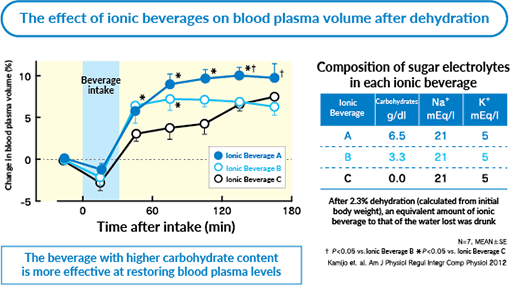
Just because it is a hypotonic drink does not necessarily mean that it will be absorbed faster.
Fluid absorption is influenced not only by osmotic pressure, but also by a combination of other factors such as sugar density and type, electrolyte density and type, and electrolyte and sugar percentages.
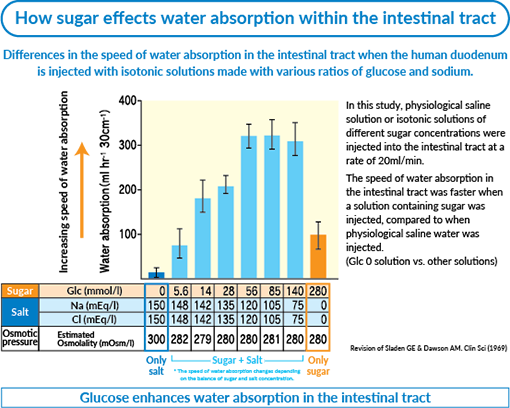
Yes, it is bad to drink too much.
It has been confirmed that losing 2% or more of body weight in fluids (1ℓ of fluids per 50kg of weight) reduces exercise performance. Therefore, you need to rehydrate frequently and take care not to lose more than 2% of your body weight in fluids. It is recommended to drink as needed when you feel thirsty, and therefore to ensure that you have easy access to water and salt, such as having an ion drink to hand.
However, you should not drink water to such excess that your body weight increases before exercising. Drinking too much may thin out the electrolytes in your blood and cause hyponatremia (low sodium level in the blood).
Women
"The Female Athlete Triad," published by The American College of Sports Medicine, is a group of health issues female athletes should watch out for. It consists of:
- 1Low energy availability
- 2Amenorrhea (absence of menstruation)
- 3Osteoporosis
These conditions are caused by continuous hard training, and their occurrence is interrelated.
- *In 2014, the International Olympic Committee (IOC) advocated the term "RED-S (Relative Energy Deficiency in Sport)" and positioned the Female Athlete Triad as one part of RED-S.
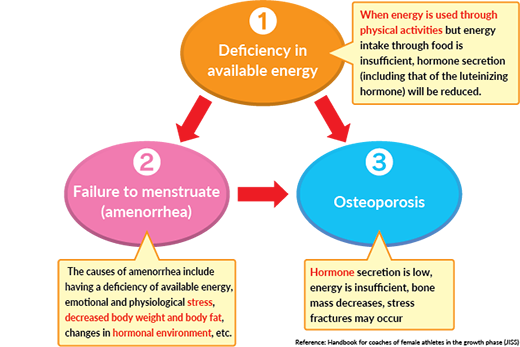
- 1Low energy availability
Low energy availability occurs when the amount of energy spent during exercise is greater than the amount absorbed through meals, resulting in insufficient energy for basic metabolism and daily activities. If this state continues, it can affect bodily functions by decreasing the amount of hormones (such as luteinizing hormones) secreted from the brain to stimulate the ovaries, or by lowering the bone metabolism."Available energy" = "Energy from food" - "Energy spent through exercise"
- 2Amenorrhea (absence of menstruation for 3 months or more)
A survey of Japan's top female athletes found that 40% of these athletes had menstrual abnormalities including amenorrhea. Amenorrhea caused by exercise is a serious problem. According to the Japan Institute of Sports Sciences (JISS), the main reasons for exercise-related amenorrhea are likely low energy availability, psychological and physical stress, reduced body weight and body fat, and hormonal changes.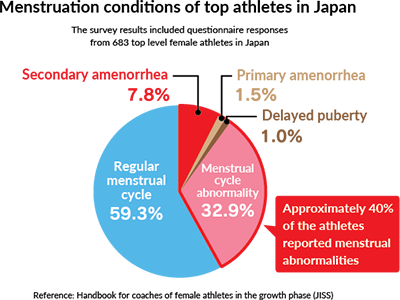
Primary amenorrhea: The first menstruation does not occur even after 18 years of age
Secondary amenorrhea: Menstruation stops for 3 months or more
Delayed puberty: The onset of puberty is late - 3Osteoporosis
Osteoporosis is a condition in which bone mass decreases, the microscopic structure of the bone tissue changes, and the bones become brittle and easily broken. The female hormone estrogen, excreted from the ovaries during menstruation, is related to the bone metabolism and protects the bones. This is why even young women can experience reduced bone mass if they stop menstruating, and risk stress fractures (a type of fracture that occurs when a slight pressure is repeatedly placed on the same location, making the bone tired and weak). It has been found that a large percentage of athletes who have suffered stress fractures have had menstrual abnormalities. For example, a JISS study showed that female athletes in their teens have especially high rates of stress fractures, and that teenage female athletes with primary or secondary amenorrhea are at higher risk of stress fractures than their counterparts who menstruate normally.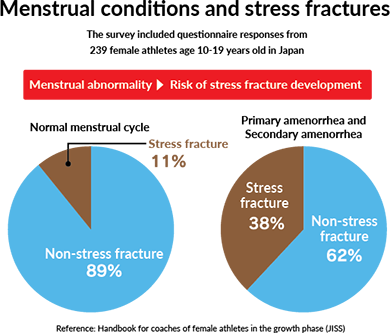
Middle and high school athletes
Middle and high school students are in the period of their lives when they are growing the fastest, and also need the most energy. Because athletes need even more energy, they must consciously manage their nutritional intake.
The things to be especially careful of are 1) eating a good breakfast, and 2) supplementing three regular meals with snacks to maintain adequate energy levels. The middle and high school years are not only a time when height and weight increases and the body is built up through muscle and bone development, but also the time when the respiratory and circulatory systems develop. Junior athletes can therefore increase their performance not only with weight training, but also by training various other bodily systems such as the brain, nervous system and the circulatory system.
Weight control
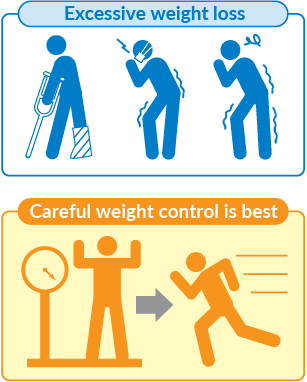
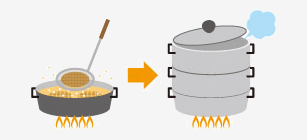
When athletes try to control their weight, it is important for them to track not only their weight changes, but also changes in their overall body composition. When losing weight, you need to reduce body fat while maintaining skeletal muscle mass.
If you push yourself too hard in losing weight, you risk suffering negative effects such as reduced muscle mass, reduced resistance, and susceptibility to injuries.
In class-based sports, it is considered advantageous to have a larger build during matches, so athletes often compete at a class lower than their normal weight. Such athletes sometimes use a water restriction method called "dry out" to rapidly decrease their body weight, but they should be aware that this method places an extreme burden on the body. There are also a lot of top athletes who do not try to rapidly reduce their weight, but rather start making adjustments and monitoring their body composition a month or more in advance. It is important to have an appropriate goal weight and a structured weight loss plan.
Misguided ideas about body weight and shape can lead to eating disorders.
For women, extreme dieting can also lead to irregular periods or amenorrhea. It is strongly recommend that you do not try to lose weight during your growth years.
People who need to control their weight sometimes remove the staple foods (such as rice) from their meals or severely restrict their food quantities, but such measures can cause fatigue and a reduction in skeletal muscle mass along with body fat.








